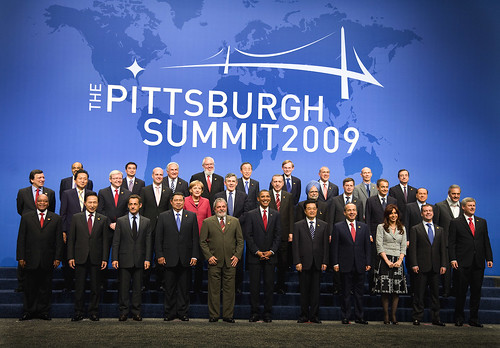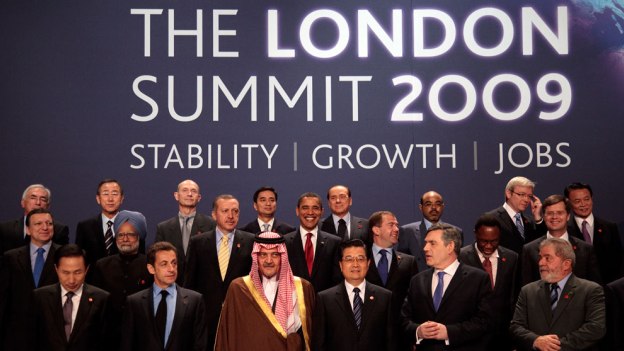
International Monetary Fund Photograph/Stephen Jaffe
by Logan Scisco
Two weeks ago, the leaders of nineteen of the world’s influential economies, with the European Union, met in Pittsburgh, Pennsylvania for another round of G-20 summit talks. The G-20 is an organization created in 1999 that is meant to be a broader discussion forum of developed and developing economies. The G-7, an economic forum that featured the United States, Canada, Germany, France, Great Britain, Italy, and Japan, was sometimes called too elitist and too isolated from emerging economies like China, India, and Brazil. (Writer’s Note: The G-8 is the name for the economic organization that includes all of the members of the G-7 plus Russia).
In Pittsburgh, President Barack Obama hosted the second meeting of the G-20 in 2009 (the first was held in London). Throughout their discussions, leaders of the countries that are part of the G-20 debated the equality of voting rights in the International Monetary Fund, banking regulations, economic stimulus packages, free trade, and deciphering what the exact mission of the G-20 was going to be.
G-20 meetings will continue to play a pivotal role in the shaping of the world’s economic output for years to come. As a result, extempers will start to see more questions about the G-20 in the future. This brief will explain the composition of the G-20, what the latest summit accomplished, and the chance that their reforms will greatly affect the world economy.


 The global financial crisis is truly a global phenomenon. A crisis that centered around a lack of credit brought about by poor judgment by financial institutions has created an international recession and the World Bank estimates that global economic growth will decline by 1.7 percent this year, the first time such a decline has existed since World War II. The Organization of Economic Cooperation and Development (OECD) has also weighed in on the financial crisis and backed up the World Bank’s claims in reporting that its 30 members will experience a 4.3 percent decline in growth this year.
The global financial crisis is truly a global phenomenon. A crisis that centered around a lack of credit brought about by poor judgment by financial institutions has created an international recession and the World Bank estimates that global economic growth will decline by 1.7 percent this year, the first time such a decline has existed since World War II. The Organization of Economic Cooperation and Development (OECD) has also weighed in on the financial crisis and backed up the World Bank’s claims in reporting that its 30 members will experience a 4.3 percent decline in growth this year.